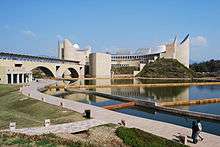Virasat-e-Khalsa
 Virasat-e-Khalsa | |
 Location within Punjab | |
| Established | 13 April 1999 |
|---|---|
| Location | Anandpur Sahib |
| Coordinates | 31°13′55″N 76°30′09″E / 31.23194°N 76.50250°ECoordinates: 31°13′55″N 76°30′09″E / 31.23194°N 76.50250°E |
| Type | Sikh museum |
| Owner | Punjab Govt. |
| Nearest car park | Open |
| Website | http://virasat-e-khalsa.net/ |
Virasat-e-Khalsa (Punjabi: ਵਿਰਾਸਤ-ਏ-ਖਾਲਸਾ) is a museum of Sikhism, located in the holy town, Anandpur Sahib, near Chandigarh, the capital of the state of Punjab. The museum celebrates 500 years of the Sikh history and the 300th anniversary of the birth of Khalsa, based on the scriptures written by the tenth and last human guru, Guru Gobind Singh.
Structure
There are two complexes at each side of a ravine, connected by a ceremonial bridge:
- The smaller western complex includes an entrance plaza, an auditorium with 400 seating-capacity, two-story research and reference library, and changing exhibition galleries.
- The eastern complex contains a round memorial building as well as extensive, permanent exhibition space, consisting of two clusters of galleries that try to evoke the fortress architecture of the region (most evident in a nearby Gurudwara) and form a dramatic silhouette against the surrounding cliff terrain. The gathering of the galleries in groups of five reflects the Five Virtues, a central tenet of Sikhism.
The buildings are constructed of poured-in-place concrete; some beams and columns remain exposed, though a great deal of the structures will be clad in a local honey-colored stone. The rooftops are stainless steel-clad and exhibit a double curvature: they gather and reflect the sky while a series of dams in the ravine create pools that reflect the entire complex at night.[1]
The building was designed by Moshe Safdie and Associates.
The Audiovisual content, films, soundscapes music and commentary are designed and produced by Bobby Bedi (Kaleidoscope)
References
External links
| Wikimedia Commons has media related to Virasat-e-Khalsa. |